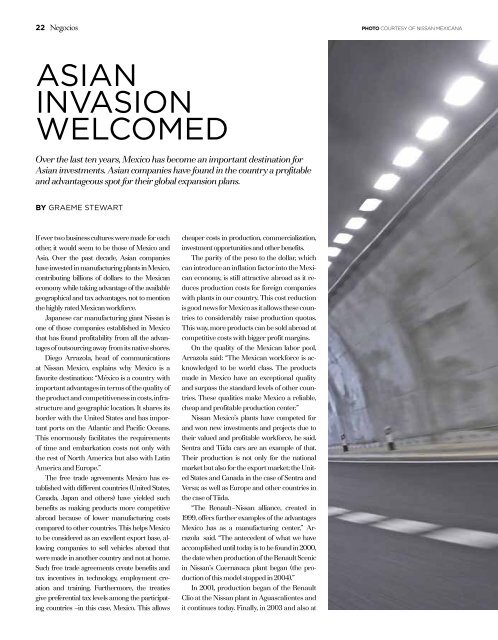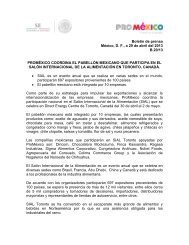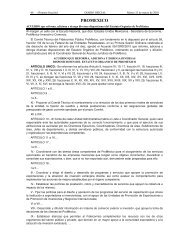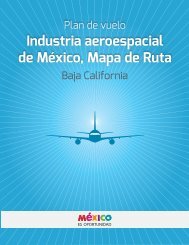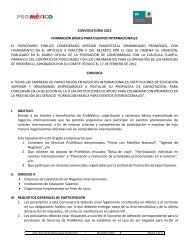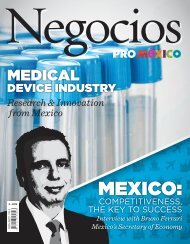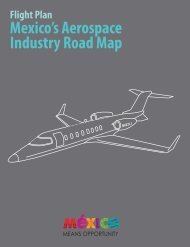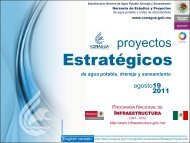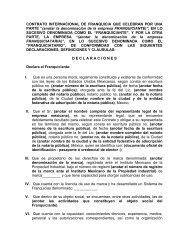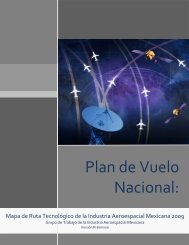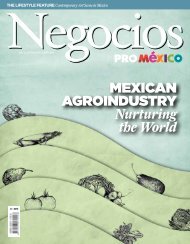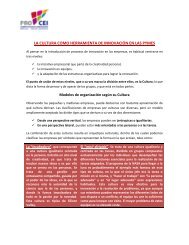ASiAn invASion wElcomEd - ProMéxico
ASiAn invASion wElcomEd - ProMéxico
ASiAn invASion wElcomEd - ProMéxico
Create successful ePaper yourself
Turn your PDF publications into a flip-book with our unique Google optimized e-Paper software.
22 Negocios Photo courtesy of nissan mexicana<br />
Asian<br />
invasion<br />
Welcomed<br />
Over the last ten years, Mexico has become an important destination for<br />
Asian investments. Asian companies have found in the country a profitable<br />
and advantageous spot for their global expansion plans.<br />
By Graeme Stewart<br />
If ever two business cultures were made for each<br />
other, it would seem to be those of Mexico and<br />
Asia. Over the past decade, Asian companies<br />
have invested in manufacturing plants in Mexico,<br />
contributing billions of dollars to the Mexican<br />
economy while taking advantage of the available<br />
geographical and tax advantages, not to mention<br />
the highly rated Mexican workforce.<br />
Japanese car manufacturing giant Nissan is<br />
one of those companies established in Mexico<br />
that has found profitability from all the advantages<br />
of outsourcing away from its native shores.<br />
Diego Arrazola, head of communications<br />
at Nissan Mexico, explains why Mexico is a<br />
favorite destination: “México is a country with<br />
important advantages in terms of the quality of<br />
the product and competitiveness in costs, infrastructure<br />
and geographic location. It shares its<br />
border with the United States and has important<br />
ports on the Atlantic and Pacific Oceans.<br />
This enormously facilitates the requirements<br />
of time and embarkation costs not only with<br />
the rest of North America but also with Latin<br />
America and Europe.”<br />
The free trade agreements Mexico has established<br />
with different countries (United States,<br />
Canada, Japan and others) have yielded such<br />
benefits as making products more competitive<br />
abroad because of lower manufacturing costs<br />
compared to other countries. This helps Mexico<br />
to be considered as an excellent export base, allowing<br />
companies to sell vehicles abroad that<br />
were made in another country and not at home.<br />
Such free trade agreements create benefits and<br />
tax incentives in technology, employment creation<br />
and training. Furthermore, the treaties<br />
give preferential tax levels among the participating<br />
countries –in this case, Mexico. This allows<br />
cheaper costs in production, commercialization,<br />
investment opportunities and other benefits.<br />
The parity of the peso to the dollar, which<br />
can introduce an inflation factor into the Mexican<br />
economy, is still attractive abroad as it reduces<br />
production costs for foreign companies<br />
with plants in our country. This cost reduction<br />
is good news for Mexico as it allows these countries<br />
to considerably raise production quotas.<br />
This way, more products can be sold abroad at<br />
competitive costs with bigger profit margins.<br />
On the quality of the Mexican labor pool,<br />
Arrazola said: “The Mexican workforce is acknowledged<br />
to be world class. The products<br />
made in Mexico have an exceptional quality<br />
and surpass the standard levels of other countries.<br />
These qualities make Mexico a reliable,<br />
cheap and profitable production center.”<br />
Nissan Mexico’s plants have competed for<br />
and won new investments and projects due to<br />
their valued and profitable workforce, he said.<br />
Sentra and Tiida cars are an example of that.<br />
Their production is not only for the national<br />
market but also for the export market; the United<br />
States and Canada in the case of Sentra and<br />
Versa; as well as Europe and other countries in<br />
the case of Tiida.<br />
“The Renault–Nissan alliance, created in<br />
1999, offers further examples of the advantages<br />
Mexico has as a manufacturing center,” Arrazola<br />
said. “The antecedent of what we have<br />
accomplished until today is to be found in 2000,<br />
the date when production of the Renault Scenic<br />
in Nissan’s Cuernavaca plant began (the production<br />
of this model stopped in 2004).”<br />
In 2001, production began of the Renault<br />
Clio at the Nissan plant in Aguascalientes and<br />
it continues today. Finally, in 2003 and also at


